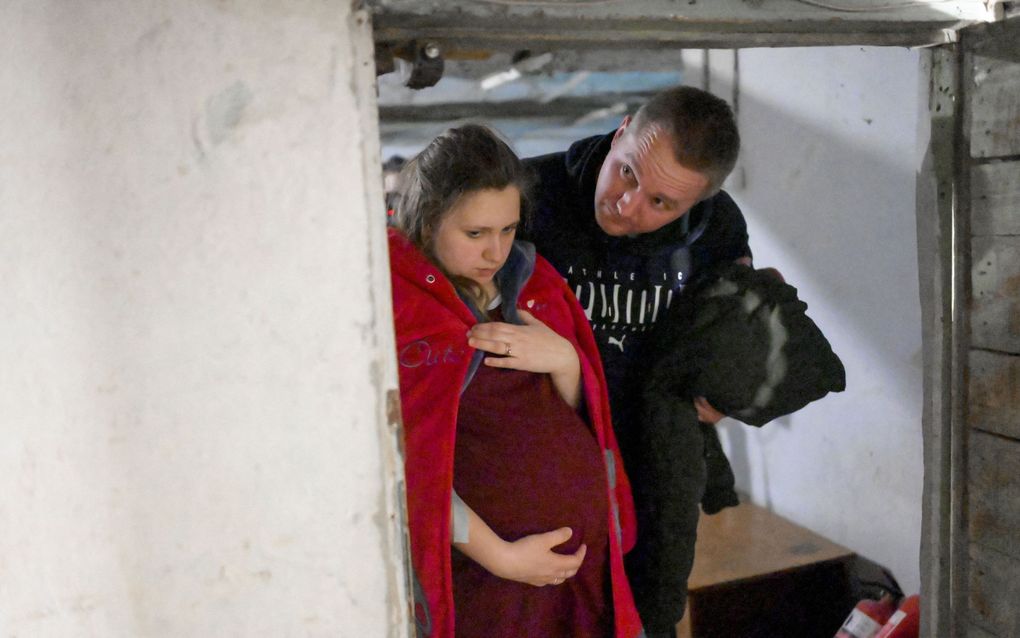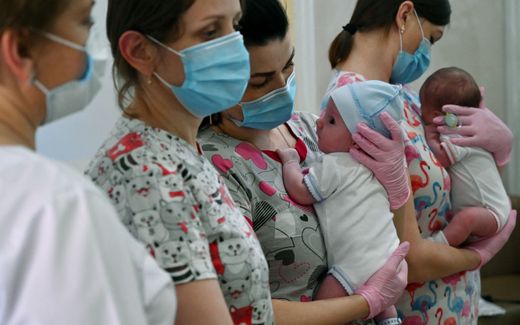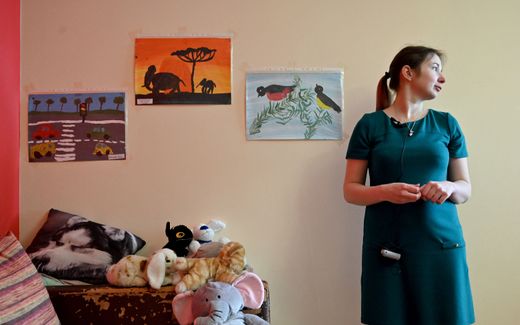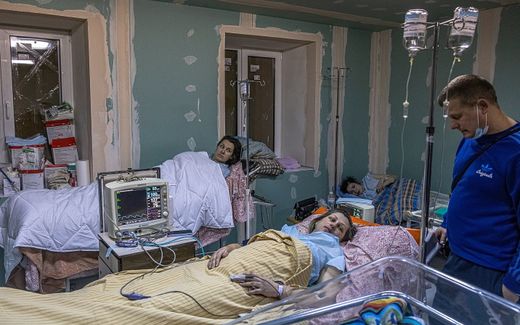Abandoned babies Ukraine show ethical problems with surrogacy
19-03-2022
Opinion
Brita Storlund

A pregnant woman and her husband walk in a basement of a maternity hospital as sirens warn for air raids in Mykolaiv, Ukraine. Almost half of the 49 women have had to give birth in the basement since 24 February. Mykolaiv is the scene of violent clashes, as Russian troops want to break down this last lock before the large port of Odesa, 130 km further west on the Black Sea. Photo AFP, Bulent Kilic
Opinion
In war-torn Ukraine, we see how surrogacy can lead to parentless children. Babies are left by their surrogate mothers, but their commissioning parents are unable to pick them up. The result? Traumatised babies who are at risk of developing long term bonding problems.
Surrogacy pregnancies should therefore be forbidden, Människovärde Brita Storlund argues. “Include the perspective of the child into the debate on surrogacy.”
Mainstream media often present surrogacy as an uncomplicated matter. Couples who cannot have children are now able to become a parent. Why wouldn't that be a good thing? And shouldn't women have the right to decide what to do with their own bodies? Besides, surrogacy can help women out of poverty.
Proponents of surrogacy also argue that children born to surrogates are the most longed for and loved children of all. The intended parents have already gone through the pain of childlessness. The surrogacy arrangement may be their last hope after all other options fail.
But the perspective of the child is missing here. Can these arguments comfort children who are unable to trace their roots? Is it enough for a child to know that his or her surrogate mother exercised the right to decide about her own body? Where are the rights of the child? And how does surrogacy affect the surrogate mother's own children?
Bond
The importance of pregnancy and breastfeeding for the baby is also missing. During pregnancy, the child has come to recognize the mother's heartbeat, her voice, her movements and so on. For this reason, a newborn baby is immediately placed on its mother's chest after birth. Not to create a bond between them, but to continue the already existing bond. Research shows that even short separations from birth mothers are stressful for newborns. With surrogacy, the child is permanently separated from the only mother it has come to know. That causes a trauma with possible long-term consequences for the child and its well-being.
But what about adoption in that sense? Adopted children also go through a separation. Why aren't we addressing that?
When it comes to adoption, the child already exists and, for some reason, needs a new family. The starting point is the child and not the needs of adults. On the other hand, surrogacy is an agreement between adults to produce a child in the future. The traumatic separation is planned beforehand, partly by the adults who later will become the child's parents. Adopted children who (sometimes with the help of a TV team) have found their biological parents almost always express that the missing piece has finally fallen into place. Their shared experience is a feeling that something in their life has been missing, although their childhood has been happy, with loving adoptive parents. Children born to a surrogate mother likely share these experiences. But for them, it may be even more difficult to trace their roots, especially if the surrogate mother was anonymous.

In May 2020, a YouTube video from Ukraine appeared in which 46 newborn babies were lined up in small beds. The babies were born to Ukrainian surrogate mothers, but due to travel restrictions, the commissioning parents had not been able to pick them up. The connection between the child and the surrogate mother was already broken, and the new caregivers were staff wearing face masks and plastic gloves. When the commissioning parents finally were able to come and get their babies, the children were subjected to another separation. At the beginning of 2022, some of these children were still not picked up.
Things can happen during a period of almost two years. What if the commissioning parents have divorced? What if they changed their minds about having a baby? And, what if a war breaks out?
It may sound extreme, but the fact is that these things have already happened. When Baby Manjhi was born in 2008 in India, the commissioning parents from Japan had already divorced. The commissioning mother, who lacked a biological connection to Manjhi, was no longer interested in becoming the mother of her former husband's child. The commissioning father, genetically connected to Manjhi, couldn't bring her home because surrogacy was illegal in Japan. And in India, he was unable to adopt her because India didn't allow single men to adopt. Three months later, however, a court decision allowed the father to register as a single parent, and he could bring Manjhi to Japan.
Vulnerable
Baby Gammy was, due to his Down Syndrome diagnosis, abandoned in 2015 by the commissioning parents from Australia. They only took Gammy's twin sister home. Gammy was left in Thailand with the surrogate mother. Baby Bridget was born in 2016 in Ukraine, and due to her special needs, the American couple never came to pick her up. Bridget ended up in a children's shelter, and the couple later got twins via another surrogate mother.
In February this year, a war broke out in Ukraine, and pregnant surrogates – who already are in a vulnerable situation – are not allowed to leave Ukraine. If they leave the country and the baby is born in a nation where surrogacy is illegal, the surrogate will be registered as the legitimate mother. In addition, the commissioning parents risk facing charges for human trafficking. Pregnant surrogates who have already left Ukraine are forced by the agency to return. That way, the baby can be born in Ukraine.
Surrogacy must be rejected out of ethical concerns. Surrogacy is exploiting both children and women, and we cannot continue doing this. The human body must not be lent out, rented out, or sold.
Brita Storlund works with the organisation Människovärde (human dignity) in Sweden. She has a Master of Human Rights and Developmental Psychology.
Related Articles






